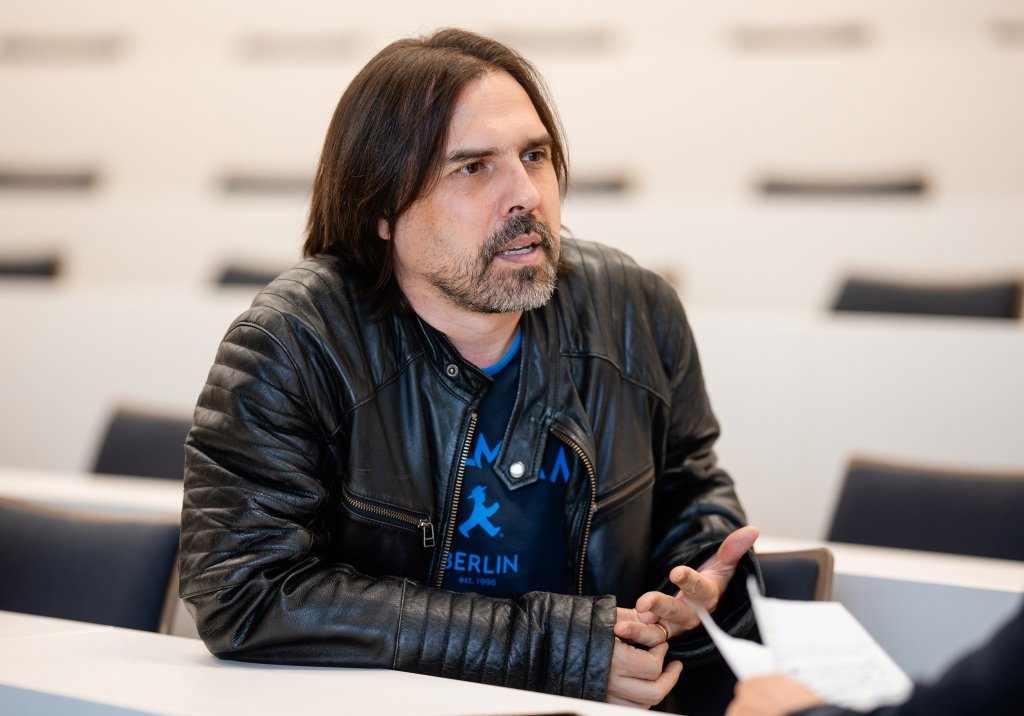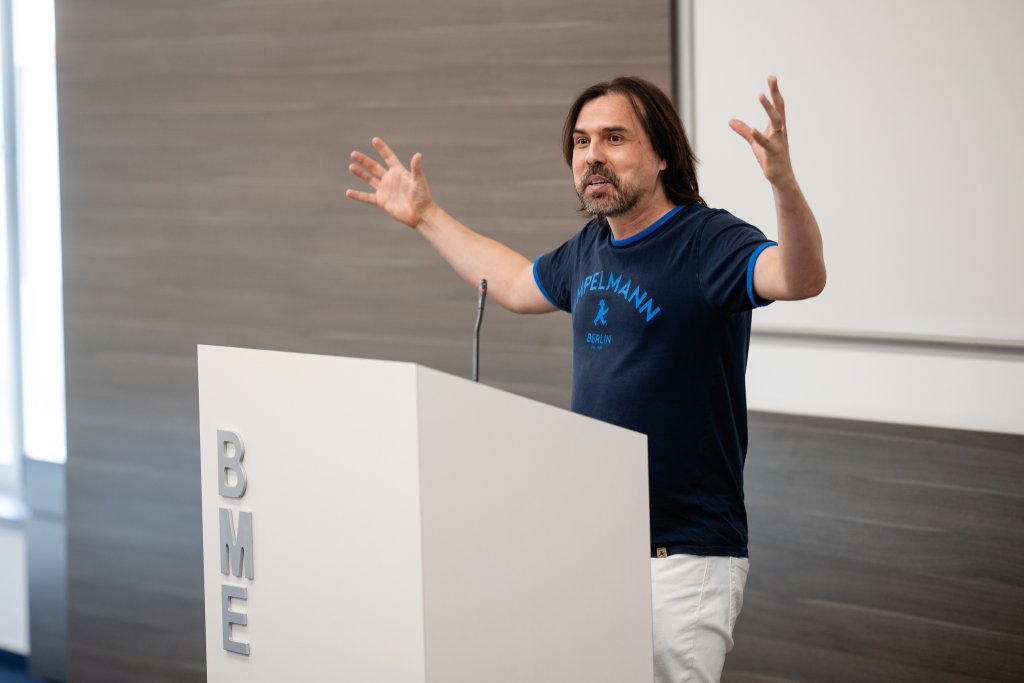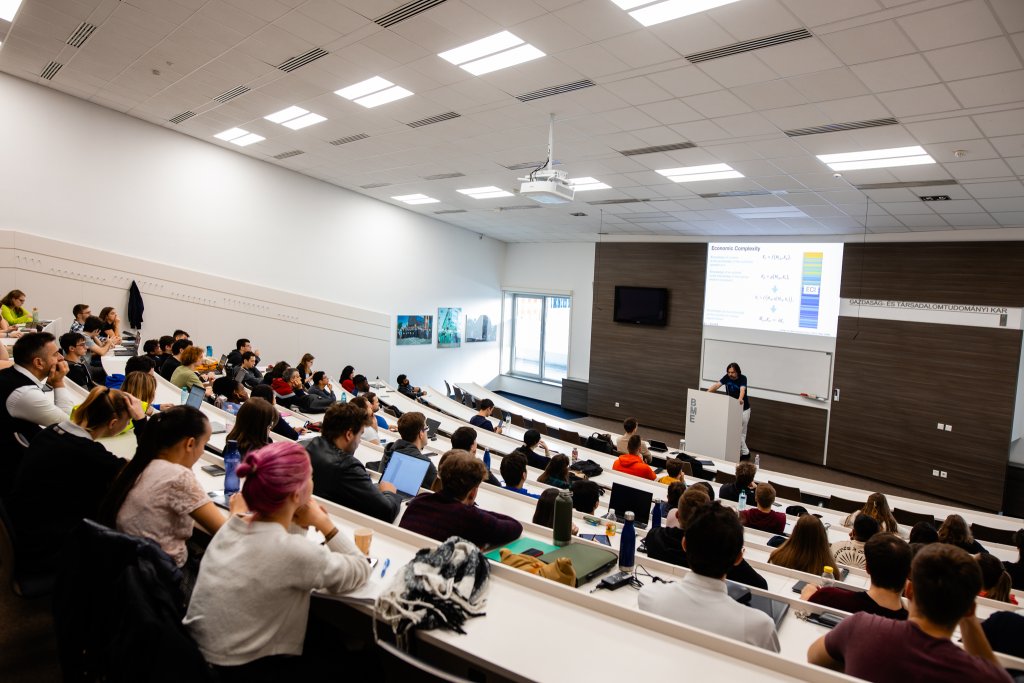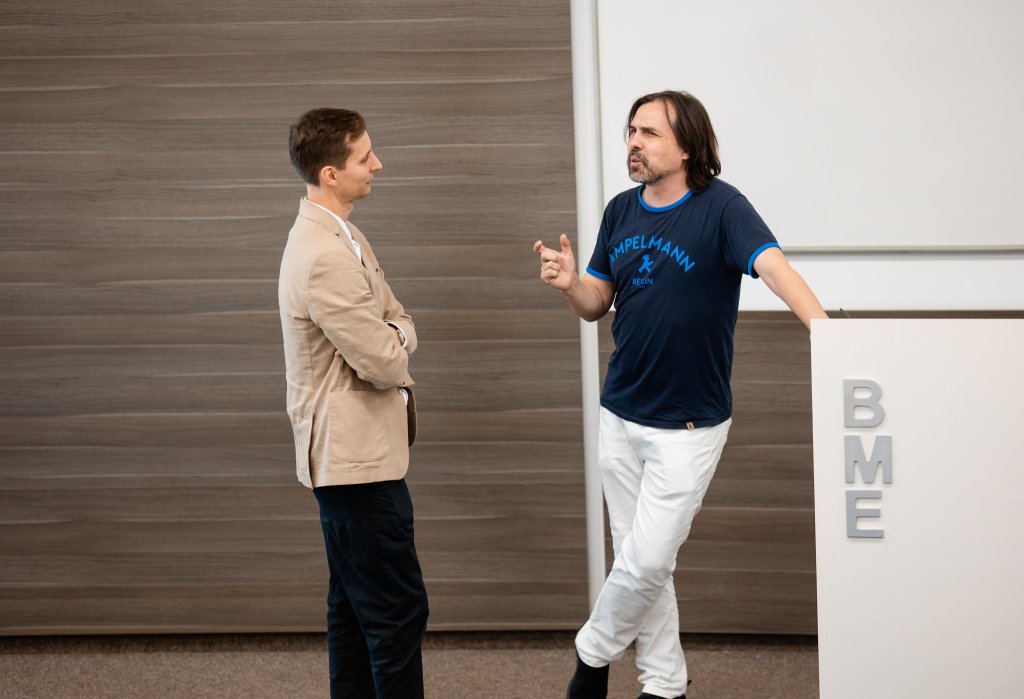Your lecture was about one of your main research areas: the complexity of the economy. How did you get from physics to economics?
– I did study physics but during my PhD I specialized in network science by working with Albert-László Barabási. That was a time when this field was developing, and the availability of data was growing: mobile phone records, medical records, trade data and so on. I’ve always always been interested in economic development, and later started to work with economists who also had that interest but didn’t have the techniques. Together we were able to apply network science tools to economic development problems, and that’s how this field emerged.
In your lecture there was an interesting part about the connections between languages. It came into my mind whether a language that is spoken by only a couple million people and has few related languages can be a disadvantage in the global economic competition.
– Yes, languages give a very aggregated view of the social network of the world. You can only communicate with people that you can talk to. So it’s very hard for people from a small language group, if they’re not connected to other languages, to be able to get their ideas out or to be able to receive knowledge or to produce knowledge that gets adopted in other places. And I think that’s why it’s important nowadays to be connected to English. If you have the lingua franca, you’re going to be able to participate in the global knowledge sphere where ideas flow.

Can your research on the complexity of the economy provide answers to questions such as how a country can get out of the middle-income trap?
– I believe it can. When you look at the middle-income trap from the perspective of complexity, you see that the countries that didn’t suffer from the middle-income trap are the ones that have high economic complexity. For instance, when South Korea had middle income, it already had high complexity, so it could emerge further. Countries like Taiwan or Singapore went just past the middle-income trap, they never saw it, because their complexity was always high. And when countries are stuck in the middle income trap is, that is because that their complexity doesn’t allow them to grow any further.
| “The world works not because a few people know a lot, but because many people know a little. Economic complexity is about understanding how that knowledge comes together”, it reads at the beginning of César Hidalgo’s presentation. The Chilean physicist, author, and born in 1979, wrote his PhD at the University of Notre Dame, with Albert-László Barabási being his advisor. He is a tenured professor at the Toulouse School of Economics and director of the Center for Collective Learning, a multidisciplinary research laboratory at Corvinus University of Budapest. He is also an Honorary Professor at the University of Manchester. He used to do research at Harvard, to teach at MIT, and he wrote successful books on economic complexity, information sciences and artificial intelligence. |
And who do you agree with concerning AI? Those who think it has great dangers, or those who think it’s just unnecessary scaremongering?
– I think the existential risk of AI is blown out of proportion. I also think that it’s an interesting tool, but at the same time, not as useful as some people are pretending that it is, for obvious business interests. But that is something that is very common to all new technologies. At some point, we’re gonna have the AI start to generate true value. But at this moment, I think it’s a bit of a bubble, and the conversations about it are over the top. We have to wait for the bubble to deflate to start seeing progress again.

I remember first reading about the ethical dilemmas of self-driving cars, that it has to be figured out who should the algorithm protect and according to what principles. Then years later, the first such cars appeared on American roads as an experiment, and I thought: hey, did we actually have this discussion? And what was the result? And why didn’t anyone tell me about it? So do we know according to what principles these cars will decide in an emergency situation?
– That’s the AI alignment problem which is not an easy one, because it’s basically about the principles that our society is going to work on. Like every time that you’re trying to align a system to a set of principles, what principles are you going to choose? Do you choose the principles of the leader or the principles of the population? If you choose the principles of the population, how do you estimate them? How do you deal with trade-offs? How do you aggregate them? So I think these are problems that are eternally open. You never get to a complete solution. You can get to a path in which you are constantly trying to improve upon them, but you’re not going to get a full solution because you don’t have full control.
And what do you think about the use of large language models in education?
– I think it’s important for people in education to be creative about the use of large language models in a way that they stimulate the learning goals they are trying to achieve. So I think that using LLMs in ways that would be similar to cheating – to have the model do the homework or solve problems – is something that we should avoid and we should be strict about. But there are other ways of use in which we can be more creative. You can criticize the output of an LLM and that type of criticism would require you to have knowledge or to be able to investigate a topic to the point in which you can discern what is true or not. So I think as long as you’re using the language model in a way that is promoting the learning goals or complementary to them, I think it’s good. Obviously, there’s a big temptation to use the language model to do the job, that’s something we have to teach people not to do. They need to take pride on their work and responsibility.

You do research at Corvinus, now came to give a lecture here at BME. Does this relationship with Hungary date back to Professor Barabási or is there any other connection you have with the country?
– Well, originally it dated back to László, so when I met him to do my PhD, he was the first Hungarian I met. And through him, I started to meet other Hungarian people. But then the relationship with Corvinus developed through other colleagues who actually were not connected to László, namely, Balázs Lengyel and László Lőrincz, professors working on topics of economic geography, which are similar to the ones that I work with. And in 2021, I think they reached out to me as they were looking to apply for a European Research Executive Agency chair, which is a grant provided by the European Union to develop research excellence in the wider European region. So they wanted to bring someone to Corvinus and I said, well, I would be interested in coming. We wrote a project together, then we got the grant.
And if your colleagues at Harvard or the University of Manchester ask you why work in the distant and exotic Eastern Europe, what do you say?
– No, I don’t get that question. I think people sort of accept that you follow your path. But what I like about working here is that I see that these are institutions that have a lot of ambition and they want to grow and they want to do better. So it’s a different game. When you are in an institution that has a big name, the game that you have to play is how you move up the organization. But when you are in these institutions that are trying to find their place in the world, the game is about how do you build the global brand of the institution? How do you help improve it? And I find that’s a more honest and more creative game.

Do you see any chance of a partnership with the BME?
– Right now I have a student who is working on a project that BME researcher Roland Molontay is co-advising. And I hope to collaborate, it looks like an interesting university. The students seem all interested and motivated.
| The Mathematical Modeling Seminar was initiated by Professor Domokos Szász in 2001 and it has been held every autumn ever since. For the past more than 20 years, Gábor Molnár-Sáska and Gergely Mádi-Nagy have been involved in organizing it, and from 2023, Roland Molontay has taken over the task. The aim of the seminar is to provide a regular platform for presenting applied mathematical results, models, and problems, as well as and to foster productive collaborations with other institutions and companies interested in mathematical modeling. This series encompasses all aspects of mathematical modeling, such as the development, analysis, refinement, and validation of mathematical models in diverse applications. |
gp

